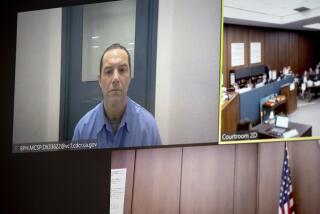Supreme Court will consider convicts’ rights to DNA tests
- Share via
WASHINGTON — Since the advent of DNA testing, at least 232 prisoners have been freed after lab results showed they did not commit the crime that put them behind bars. But in some states, prisoners still have no right to test evidence that might exonerate them.
On Monday, the Supreme Court will be asked to rule for the first time that the constitutional guarantee of due process of law gives convicts -- as well as those who are presumed innocent -- the right to seek test evidence that could show they are innocent.
“We have to convince the court that this is something so powerful, so unique and so conclusive that it is arbitrary and unfair to deny it,” said David Rudovsky, a University of Pennsylvania law professor who has represented several inmates who were freed after DNA tests exonerated them.
The justices will hear the case of William G. Osborne, an Alaska man convicted of rape, who says new DNA testing of a semen sample in police files will show he is innocent.
From his vantage point, Osborne is doubly unlucky. In 44 states, but not Alaska, prisoners can file petitions to obtain new DNA tests of evidence on file, so long as the test can prove they are innocent or guilty. Congress has passed a similar law for federal prisoners.
Besides Alaska, only Alabama, Massachusetts, Oklahoma, Mississippi and South Dakota do not have laws that allow new DNA tests for convicted prisoners, according to the Innocence Project in New York. In a few states that do provide for testing, only death row inmates have a right to the DNA.
Lawyers for the Innocence Project have pursued Osborne’s case not only in an effort to exonerate him, but to strengthen the rights of prisoners across the nation who say new tests on old evidence will prove their innocence.
There is reason to doubt that Osborne is innocent. He was convicted, along with another man, in the brutal 1993 rape and assault of a prostitute outside Anchorage. His codefendant and the victim pointed to him as one of the attackers. One lab test on a semen sample included him as a possible suspect, and his lawyer decided against having the sample subjected to more-sophisticated testing.
A decade after his conviction, he admitted to the crime in a parole hearing. (After he was released, he was sent back to prison for a robbery.)
Nonetheless, Osborne has continued to insist that a modern DNA test of a condom found at the crime scene will show he was not guilty of the rape.
Last year, the U.S. 9th Circuit Court of Appeals ruled in his favor, saying that his “right to due process prohibits the state from denying him reasonable access to biological evidence for the purpose of further DNA testing.”
On Monday, lawyers for Alaska will urge the Supreme Court to reverse that decision and rule that prisoners have no legal right to old evidence, particularly when they could have sought the testing before trial.
The state’s attorneys will be joined by a government lawyer representing the Obama administration. In December, the Bush administration’s solicitor general joined the case on Alaska’s side and faulted the 9th Circuit Court for recognizing “a new constitutional right” for convicted prisoners.
By tradition, the solicitor general does not change the government’s position in pending cases before the Supreme Court, even when a new administration takes power.
--
More to Read
Sign up for Essential California
The most important California stories and recommendations in your inbox every morning.
You may occasionally receive promotional content from the Los Angeles Times.











